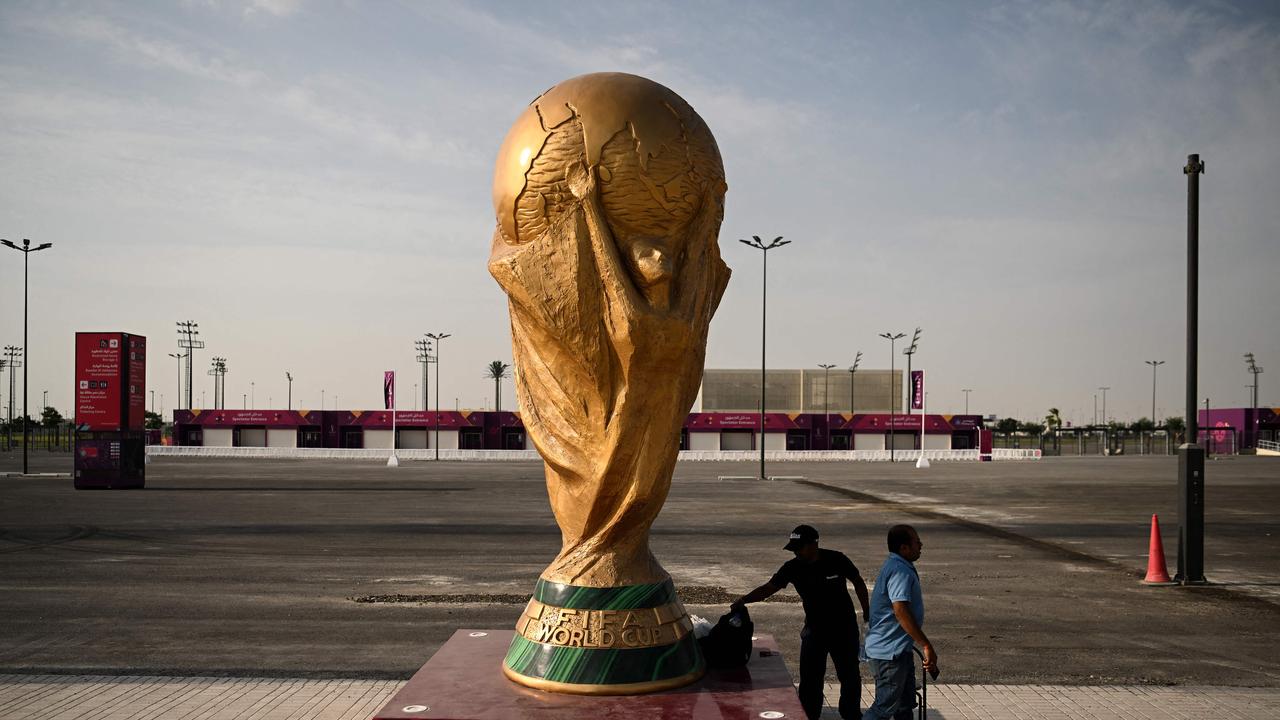Qatar’s laws put Football World Cup fans at risk
The Football World Cup is a week away now but fans heading to the event will need to be careful – or the consequences could be dire.

Football fans face being thrown behind bars or flogged over minor offences as they jet out to Qatar for the World Cup.
Boozing, swearing, taking photos and even having sex could all land people jail sentences thanks to “vague” and “confusing” laws in the Muslim Gulf State, The Sun reports.
Qatar still has capital punishment – and legal medieval punishments include flogging and stoning, although the latter has never been used.
About 1.2 million people are expected to travel to Qatar ahead of the tournament kicking off on November 20.
Radha Stirling, founder and director of the Detained in Dubai legal aid group, which has launched an app to help World Cup fans facing problems, has warned fans could end up in trouble for trivial issues.
“Qatar has not experienced mass tourism before this year and it is highly likely visitors will get into trouble, similar to the cases we have seen in Dubai over the past decade,” she told The Sun.
“It is difficult to advise people to ‘obey the law’ when the laws are so strict that Qatar is telling police to ‘go easy on tourists’ during the cup.
“Arbitrary enforcement of the law creates confusion and risk to visitors.
“Like in Dubai, people are often singled out when a complaint is made to police by a local Qatari who has been ‘offended’ by a visitor.
“The police are then obliged to act on the complaint.”

Visitors could find themselves nicked for public drunkenness even if they have only had a tiny tipple because of the unclear nature of alcohol laws.
For example, if a drinker is reported to cops for “offending” someone, they would likely be charged with public drunkenness.
Guzzling booze in public spaces is also banned and could result in a six-month prison sentence or a hefty fine.
Lashes have also been dished out for people found drinking alcohol.
Meanwhile, taking photos without permission, flirting, swearing and arguing could also land footie fans in jail.
According to Detained in Dubai, the first person to report behaviour to the police will be taken the most seriously, even if it is completely unfair.
In Qatar, same-sex conduct is punishable by up to seven years in jail as it remains an offence under the Penal Code.
According to Article 296, “leading, instigating or seducing a male in any way to commit sodomy or dissipation” and “inducing or seducing a male or a female in any way to commit illegal or immoral actions” are crimes.
Radha said: “Sex outside marriage is illegal in Qatar so couples who book hotel rooms together are already in violation of the law, simply ‘hoping’ the law won’t be enforced.
“Homosexuality is unlawful and those who share a hotel room could be equally at risk.
“Visiting a destination and ‘hoping’ that illegal acts are not prosecuted puts visitors in a dangerous situation.
“Qatar’s abysmal human rights record means that abiding by the law does not protect visitors from prosecution or wrongful detention.
“Qatar should have been required to update laws to accommodate the hundreds of thousands of visitors expected this year.”

Qatar has also been accused of curtailing freedom of expression by using harsh laws to stifle voices.
Protesters at the upcoming World Cup could be slapped with a five-year prison sentence and fines of up to £23,000 ($A40,000) for “stirring up public opinion”.
The punishments can be dished out thanks to a vague law passed in 2020, which Amnesty blasted as “an attack on freedom of expression … (that) could silence peaceful protest.”
It reads: “Anyone who broadcasts, publishes, or republishes false or biased rumours, statements, or news, or inflammatory propaganda, domestically or abroad, with the intent to harm national interests, stir up public opinion, or infringe on the social system or the public system of the state.”
Meanwhile, female football fans risk jail or flogging if they report being the victim of a sex attack, lawyers have warned.
Figures show soccer stadiums become sex assault hot spots when booze-fuelled crowds flock to big games during tournaments.
But thousands of women fans expected to travel to the Muslim Gulf State in November have been warned they face prosecution if they report offences.
Qatar’s strict Islamic code outlaws all sexual contact between unmarried couples.
This means that even rape victims can be prosecuted for what the state deems as “having sex” outside of marriage.
Around 100 prosecutions a year have been recorded under the strict “zina” laws banning sex and pregnancy outside of marriage.
Even rape victims have been prosecuted after suspects claimed sex was consensual – and handed sentences ranging from seven years jail to flogging with a whip or stick.
In 2016 a 22-year-old Dutch woman, named only as Laura, was convicted of extramarital sex, fined £580 ($A1000) and given a one-year suspended sentence after reporting a brutal rape.
She was drugged in a nightclub in Qatar before being sexually assaulted – but was arrested immediately when she reported the incident.
Qatar’s Ministry of Foreign Affairs insists that it is “one of the safest countries in the world,” and that “everyone is welcome and no one is discriminated against”.

Unlike neighbouring Saudi Arabia, women in Qatar have been free to work, drive, and hold public office for decades.
And Qatari police and tournament organisers have issued a statement insisting that it will not prosecute drunk football fans or members of the LGBTQ+ community who show affection.
The document, as seen by the Dutch publication AD, states that women who report sexual assault or rape do not have to fear getting prosecuted for adultery or extramarital sex.
Detained in Dubai has launched a new emergency help app for those travelling out for the World Cup.
Radha said: “We have seen how Qatar overreacted when a British man was arrested for carrying an unused herb grinder or when they violated female passengers on-board a flight to Australia.
“Female rape victims have been jailed for sex outside marriage and local prisons are notorious for human rights violations.
“We have launched an app where people can use the chat function to request urgent help or to receive warning alerts and notifications to keep people out of trouble as much as possible.”
In 2019, Conor Howard, from Scotland, was detained in Doha during a stopover flight between Australia and the UK over a brand new herb grinder that authorities wrongly perceived as a “cannabis grinder”.
He was allowed to return home, but months later while trying to visit his mum in Corfu was arrested by Greek authorities after they were notified of an outstanding warrant issued by Qatar over drug possession allegations.
Conor spent around a month in a Greek prison before being released on bail, when a court dropped a case over lack of evidence.
This story first appeared in The Sun and was republished with permission.



